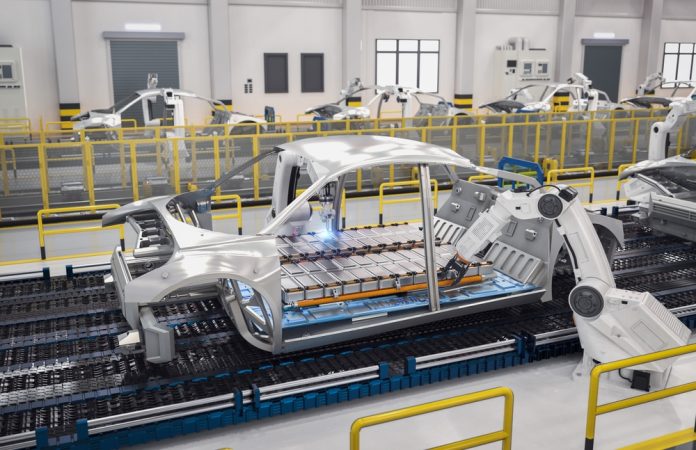Recent announcements showcase the UK as an attractive location for battery manufacturing, but redoubling of efforts are needed to keep pace with investments across Europe.
In an update to its 2022 study, the Faraday Institution predicts that by 2030, the UK will need the equivalent of six gigafactories (large, high-volume battery manufacturing facilities), each producing 20 GWh per year of batteries.
By 2040, the demand is expected to rise to the equivalent of ten of these gigafactories. Fewer, larger gigafactories reaching the same total capacity could meet this demand.
EV battery manufacturing is moving slowly in the UK
Recent gigafactory announcements in the UK by AESC and Tata Group have built excitement about the potential to create a new, dynamic and highly skilled battery industry in the UK.
The report finds that 270,000 UK jobs could be supported by the EV and battery industry by 2040.
These announcements showcase the UK as an attractive location for EV battery manufacturing companies to build their European plants. However, the UK is making progress but not moving fast enough compared to its European competitors.
UK battery manufacturing plants announced or under construction are expected to reach a combined capacity of 57.6 GWh by 2030, equivalent to around 4% of total European GWh capacity, behind Germany (21%) and six other countries.
At present, existing gigafactory development plans do not address 47% of the projected demand for UK batteries by 2030.
Furthermore, 71% of the demand projected for 2040 has yet to be met.
Developing an efficient supply chain
The UK Government previously developed a strategy and implemented a wide range of policies and incentives to help create a new battery manufacturing industry in the UK.
For example, the UK Battery Strategy adopts a Design-Build-Sustain approach to enhance innovation, manufacturing and sustainability across the battery ecosystem.
The UK Government and industry stakeholders still need to make timely and coordinated efforts to attract more gigafactories to the UK.
Developing a resilient, sustainable, and efficient supply chain alongside building up skills and capability will also be critical to securing the future of the UK automotive industry.
Minister for Industry and Decarbonisation Sarah Jones said: “Our modern Industrial Strategy will build on this legacy and bring growth, jobs and opportunities to every part of the UK.
“We continue to work with investors and industry through our Automotive Transformation Fund (ATF) to progress plans to build a globally competitive electric vehicle supply chain here in the UK, including work on unlocking crucial investment in gigafactories.”
Stephen Gifford, Chief Economist, Faraday Institution, added: “There is a growing sense of optimism that a highly productive and sustainable battery manufacturing industry can be built in the UK.
“By 2040, a successful industry could employ 170,000 people in EV battery manufacturing, 35,000 people in gigafactories and 65,000 people in the battery supply chain.”
Continued efforts needed
Concerted and coordinated efforts will be needed to improve the competitiveness of the UK and position the UK as a leader in cutting-edge battery technology through action in the following areas:
- Attract inward investment to establish new gigafactories and expand existing plants in the UK. This will enhance large-scale battery manufacturing capabilities and position the UK as a competitive player in the European battery market.
- Strengthen component manufacturing within the UK, focusing on producing vital battery components such as cathodes, anodes, electrolytes, separators and cell casings to comply with trade agreements and improve supply chain efficiency.
- Invest in the development of UK-based refining and processing facilities for key battery materials such as lithium, nickel, cobalt and graphite to enhance the self-sufficiency of the UK battery supply chain and reduce reliance on imports.
- Enhance supply chain resilience by securing critical raw materials from international agreements with the USA, Canada, Australia and lithium-triangle countries in South America and by establishing a competitive lithium battery recycling industry in the UK.
- Accelerate the exploration and commercial extraction of key battery materials within the UK, especially for lithium and graphite, to reduce dependence on imports and ensure a steady supply of raw materials critical for battery manufacturing.
- Provide a long-term commitment to mission-based research into batteries that are cheaper, lighter weight, longer-lasting, safer, manufacturable, and fully recyclable.
- Intensify investment in pioneering research into next-generation battery technologies such as solid-state, sodium-ion and lithium-sulfur.
- Strengthen initiatives to commercialise innovative battery technologies through strategic partnerships and collaboration, focusing on accelerating the path to market readiness.








